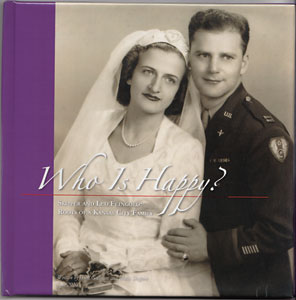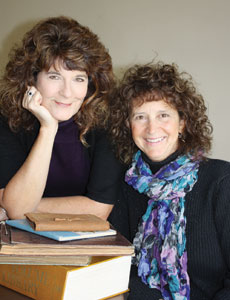 How many times have you sat with Zayde or Aunt Esther and promised yourself that sometime soon you will chat with him or her and capture all their life stories before they aren’t able to tell them anymore?
How many times have you sat with Zayde or Aunt Esther and promised yourself that sometime soon you will chat with him or her and capture all their life stories before they aren’t able to tell them anymore?
Maybe you don’t have the time to talk to Zayde about those stories yourself. Or maybe you don’t feel you have the expertise to chronicle Aunt Esther’s stories properly. That’s how Trudi Galblum and Molly Shapiro can get involved. As professional writers, they will write and publish these precious stories for you. (At least one other Jewish-owned company is also producing family histories. See separate story this page.)
The pair work together at Trudi Galblum Communications, a company Galblum has owned since 1991. It specializes in writing for nonprofit organizations, companies and families seeking to build support, inspire hope, document achievement and preserve legacies. Over the years they have written several corporate histories, including those of Health Midwest and Menorah Medical Center.
“What we bring to this type of project is a long history of interviewing people about their lives and putting it together in an entertaining format that people will pick up and read,” Galblum said.
A creative writer as well as a journalist, Shapiro has written a number of commissioned screenplays and published a book of short stories “Eternal City,” which won the Willa Cather Fiction Prize. Her first novel will be published by Ballentine early next year.
“We’re pulling out gems of Kansas City history that are going to disappear soon,” Galblum said. “When people preserve that history by sharing their story it is a gift to the community.”
Galblum first became interested in individual and family histories almost a decade ago. She was in the process of completing Barney Karbank’s personal history when he passed away in 2002.
The fact that subjects are often in their twilight years is one reason Shapiro thinks putting personal stories and histories in written form is important to do sooner than later.
“I have several friends who’ve recently lost grandparents or parents and say they wish they would have done this when their loved one was alive because now those stories are gone,” Shapiro said.
“Trudi and I know how precarious all this is and how important it is. A lot of people, while they know it’s important, really don’t deal with it until it’s too late,” Shapiro said.
Many times, Shapiro said, people feel weird about initiating the story-telling process because that action would somehow be admitting that he or she might not be alive much longer.
They have found that while some people are hesitant to begin telling their stories, once they get started they become more comfortable with the interview process.
“This might be a person’s first and only opportunity to share their life’s journey,” Shapiro said. “It can be an exhilarating experience to have someone wanting to hear all the details of your life.”
One of the pair’s most recent projects resulted in a hardcover book about Galblum’s inlaws — Skipper and Leo Feingold. They started interviewing them about a year ago.
“What was really poignant about all this is Leo was 95 when we started and he passed away two months after we finished our interviews,” Galblum said.
The process is a little different for each subject, because every person, business or family is unique. It always includes an initial meeting and in-person interviews. The final product can include photographs, letters and archival materials in formats ranging from a simple manuscript printed on a personal computer to a published book.
“We will customize every project to meet the subject’s needs,” Galblum said.
Galblum said it’s common for a project to grow once the subject gets started and comfortable with the interview process.
“We try to estimate how many interviews it will take in the beginning,” Galblum said. “But then later they’ll ask us to interview this person and that person.”
Galblum said it’s realistic to think that a couple’s interview can be completed in 10 hours. Sessions usually don’t last longer than two hours because the subject, and the interviewer, often gets tired after that length of time.
The cost of a personal history typically ranges from $3,000 to $6,000, depending on the number of people interviewed, the number of photos included, and the quantity and quality of books printed. Shapiro said histories that involve numerous people and/or a family business would likely cost more.
“I think all the old pictures add so much to it,” Shapiro said.
“We know it has to be cost effective for people, so we’re making sure to provide lots of options,” she continued.
For more information about these histories, contact Trudi Galblum at or Molly Shapiro at .
Keepsake Chronicles preserves life stories
 Keepsake Chronicles is another Jewish-owned company helping people capture and preserve their life stories. Diane Wubbenhorst, a member of Congregation Kol Ami, and her business partner Jamie Thaemert, said Keepsake Chronicles has been in business since late February. The company, which holds a membership in the Association of Personal Historians, specializes in capturing, chronicling and producing people’s life stories using a unique story gathering process.
Keepsake Chronicles is another Jewish-owned company helping people capture and preserve their life stories. Diane Wubbenhorst, a member of Congregation Kol Ami, and her business partner Jamie Thaemert, said Keepsake Chronicles has been in business since late February. The company, which holds a membership in the Association of Personal Historians, specializes in capturing, chronicling and producing people’s life stories using a unique story gathering process.
The subject, called the “star” by Keepsake Chronicles, is first assigned to fill a Keepsake Reflection Box with memorabilia that reflects highlights of his/her life including photos, medals, certificates, jewelry, etc. The interview captures the “star’s” stories surrounding the contents of the Reflection Box.
The “star” is also asked to complete fact and timeline sheets to help spark memories.
In addition, dedications and tributes from family members are collected by Keepsake Chronicles. The “star” doesn’t see the tributes and dedications until he/she receives the finished book.
Most of the company’s clients are adult children of people in their 70s and 80s, Thaemert said.
“Siblings band together to buy our service to help create a lasting keepsake and to honor their parents or grandparents.”
Wubbenhorst said Cantor Paul Silbersher piqued her own personal interest in family history. He influenced her to seek information about her parents. She started her journey with her mother’s family, who were Ashkenazi Jews from Eastern Europe.
“They migrated to England in approximately 1887 during difficult times in their homeland of Lithuania,” she said. “They were deeply rooted in the tailoring business.”
Wubbenhorst, a graduate of the Florence Melton adult Jewish studies program who performs with the Tikvah Dancers, began searching for another career after being laid off by Sprint in 2009.
“I was blessed to find that my friend of 20 years, Jamie Thaemert, was also passionate about capturing family history,” she said.
Wubbenhorst likens the importance of creating a lasting family history to a quote from the television show “The Wonder Years,”
“Memory is a way of holding onto the things you love, the things you are, the things you never want to lose.”
Keepsake sells three main products: The Klassic Book (portrait format, hardbound) sells for $1,295; The Kontemporary Book (landscape format, hardbound) sells for $1,325 and the Keepsake Video (voiceover narration, interview footage, still photos and photo gallery slideshow) sells for $965.
For more information, you can visit the website at keepsakechronicles.com or e-mail Keepsake Chronicles .


